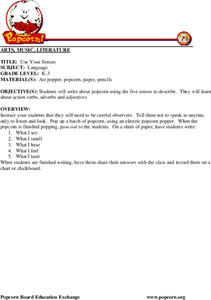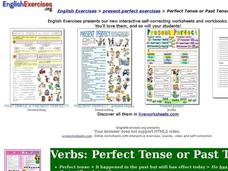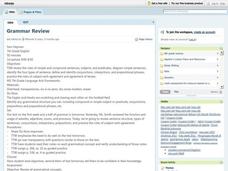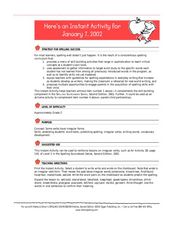Curated OER
Use Your Senses
Students use their five senses to write about popcorn to share with the class. The study the use of action verbs, adverbs,, and adjectives.
Curated OER
Parts of Speech
Need an overview of the parts of speech? Young grammarians view 14 slides that define each part of speech, provide examples, and list the basic rules for the proper use of these elements. The presentation concludes with a sentence that...
Curated OER
Tenses and Time Expressions
Now that your class has worked to understand verb tenses and time expressions, assess them on their understanding and application. Seven questions are provided here; for each, English language learners (or young native speakers) must...
Curated OER
Have Something Done Exercise
Particularly useful for English language learners, this resource tests learners on their ability to distinguish between doing something and having something done. There's an example at the top of the page and 15 sentences that follow....
Curated OER
Perfect Tense or Past Tense
Bring your class to the computer lab or set up computers in the back of the classroom for this online activity. They complete 12 sentences using either the past tense or the perfect tense. Answers are easily accessible; all they have to...
Curated OER
Present Perfect or Past Simple Tense?
Does the sentence require the present perfect or the past simple tense? Meant to be an online resource, you could easily print this to complete in the classroom. Learners fill in each blank with the correct tense. Ten questions are listed.
Curated OER
The Present Is Perfect: Using Present Perfect Tense
Your developing language users rewrite 10 sentences by changing the underlined verbs to present perfect tense verbs with one of the helping verbs: have, has, or had. Resource contains explanatory material as well as a practice worksheet.
Curated OER
Parts of Speech
An 11-slide PowerPoint covers many parts of speech including: nouns, verbs, adjectives, adverbs, prepositions, interjections, and conjunctions. Each section has a description and examples of the parts of speech. Tip: Ask your listeners...
Curated OER
Parts of Speech
What better way to practice employing the different parts of speech than through a song? Young scholars color code different parts of speech in song lyrics, working first as a whole group and then individually. The parts of speech...
Curated OER
Common and Proper Nouns
Identify nouns in speech and writing. Learners find all the nouns in a read-aloud story. Then, they complete a worksheet that reviews the use of nouns, verbs, adjectives, prepositions, conjunctions, pronouns, and interjections. A list of...
Curated OER
Grammar Review
Review grammar rules for simple and compound sentences. Learners diagram sentences and identify conjunctions, interjections, and prepositional phrases. As a class, they study their notes and complete pages in their grammar book to...
Curated OER
Simple Past - Irregular
Here is a flashing, blinking, colorful, interactive, online worksheet that would be handy to keep fast finishers on the job in a computer lab. They choose correct past tense forms from drop-down menus for each of eight illustrated...
Curated OER
Past Tense Irregular Verbs
With this worksheet, youngsters review past tense irregular words and predict the spelling of these words. They complete a worksheet where they fill in the missing letters of irregular verbs. The sheet provides the exact number of spaces...
Curated OER
Simple Future Tense: Exercise 5
Here’s a practice set for the simple future tense and the present tense with an adverb form. No answer key is provided, but a brief explanation of these tense forms does precede each exercise set. This resource could be used as a pretest...
Curated OER
Word Choice: Descriptive Verbs
In this word choice worksheet, students will read a 5 paragraph essay about an igloo hotel. Then students will replace 10 verbs with more descriptive verbs. Next, students will use strong verbs from a word bank to complete 14 sentences...
Curated OER
The Parts of Speech
Identify action verbs and decide whether they are transitive or intransitive. After labeling fourteen sentences and their verbs, learners move on to distinguish action verbs from linking verbs in twenty additional sentences. The...
Curated OER
Preterite vs. Imperfect #9
What is the difference between the preterite tense and the imperfect? Compare the two, and then give your class this practice half-sheet. There are 12 verbs in parentheses, and your class must decide which should be in the preterite...
Curated OER
Preterite Tense: irregular verbs
Learning irregular verbs are tough since they don't follow some sort of pattern. Use this as a bell-ringer or an exit ticket to determine how much your class understands the challenging verbs in the preterite tense. Verbs like traer,...
Curated OER
Conditional Tense: regular and irregular verb #2
The conditional tense expresses probability, possibility, and wonder. Teach your class how to conjugate verbs in the conditional tense, and then give them this short practice. There's a sentence provided in English, and then the...
Curated OER
Saber vs. Conocer #1
What is the difference between the verb saber and conocer? Although they are similar, they are used differently. Test your language learners with this short exercise. They complete the provided dialogue by completing the incomplete...
Curated OER
Preterite vs. Imperfect #8
When do you use the preterite tense, and when do you use the imperfect? They're commonly confused, so give your class lots of practice opportunities to drill the difference into their memory! This short exercise would be a great...
Curated OER
Subject-Verb Agreement - To Be (was,were)
Was he or were they? Young grammarians are challenged to use the correct past tense form of to be in the 10 sentences of a grammar practice worksheet. Because no definitions or examples are given, you might use the exercise as an...
Curated OER
Preterite vs. Imperfect #3
Hm, to use the preterite or the imperfect? That is the question with this short practice activity! Use it as a bell-ringer or a short homework assignment. Learners simply read the paragraph and conjugate the verbs in parentheses to...
San José State University
Transitive and Intransitive Verbs
Clarify the difference between transitive and intransitive verbs and when to use lay versus lie. Various examples are given before writers practice underlining verbs, circling the object of each verb, and filling in sentences with either...

























